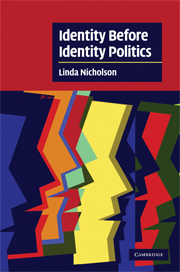Book contents
- Frontmatter
- Contents
- Acknowledgements
- Introduction
- 1 The politics of identity: race and sex before the twentieth century
- Introduction to chapters 2 and 3
- 2 Freud and the rise of the psychological self
- 3 The culture concept and social identity
- Introduction to chapters 4 and 5
- 4 Before Black Power: constructing an African American identity
- 5 Womem's identity/women's politics
- Epilogue: identity politics forty years later: assessing their value
- Index
- Cambridge Cultural Social Studies
5 - Womem's identity/women's politics
Published online by Cambridge University Press: 17 July 2009
- Frontmatter
- Contents
- Acknowledgements
- Introduction
- 1 The politics of identity: race and sex before the twentieth century
- Introduction to chapters 2 and 3
- 2 Freud and the rise of the psychological self
- 3 The culture concept and social identity
- Introduction to chapters 4 and 5
- 4 Before Black Power: constructing an African American identity
- 5 Womem's identity/women's politics
- Epilogue: identity politics forty years later: assessing their value
- Index
- Cambridge Cultural Social Studies
Summary
In the previous chapter, I argued that changes in the history of black politics in the twentieth century – including the emergence of Black Power in the mid 1960s – were importantly rooted in changing understandings of black identity as these evolved among different groups of African Americans over the course of that century. Similarly, in this chapter I want to make a related claim about the history of activism around women's issues in the United States in the nineteenth and twentieth centuries. Here too, political changes were importantly based in changing understandings of the meaning of female identity as these developed among different groups of women and men over the course of this period.
Moreover, I believe that a focus on these changing understandings of female identity will necessitate a reconsideration of how we think about the history of those political changes. Since the early years of “women's liberation” in the late 1960s and early 1970s in the US, many scholars, including myself, have talked about that history in terms of “waves.” The first “wave” supposedly encompassed the nineteenth-century women's movement leading up to suffrage. The period between 1920 and the early 1960s was then described as a time of relative calm.
- Type
- Chapter
- Information
- Identity Before Identity Politics , pp. 139 - 175Publisher: Cambridge University PressPrint publication year: 2008

